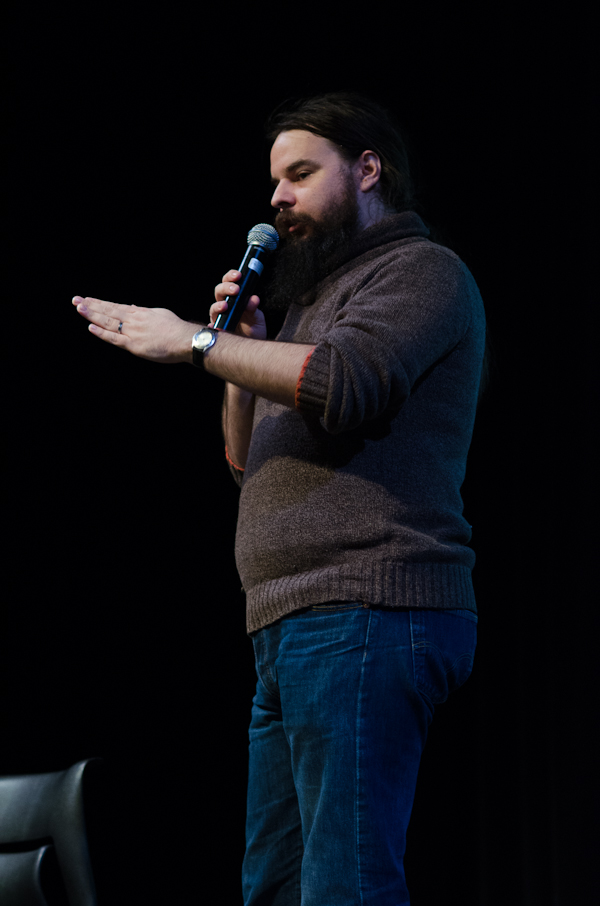This post has not been edited by the GamesBeat staff. Opinions by GamesBeat community writers do not necessarily reflect those of the staff.
 For his keynote speech at Gamercamp in Toronto, game developer Shawn McGrath gave the floor to his Twitter followers, who overwhelmingly asked about the technology that went into his psychedelic abstract shooter Dyad for the PlayStation 3. But time ran out before he could circle back to the topic he really wanted to tackle: how storylines in video games are "a worthless endeavour."
For his keynote speech at Gamercamp in Toronto, game developer Shawn McGrath gave the floor to his Twitter followers, who overwhelmingly asked about the technology that went into his psychedelic abstract shooter Dyad for the PlayStation 3. But time ran out before he could circle back to the topic he really wanted to tackle: how storylines in video games are "a worthless endeavour."
That's an especially controversial thesis considering that many of the discussions at Gamercamp centered about elevating narratives in games.
I spoke with McGrath after his talk, and it became clear that his potentially controversial take was really an outright rebuttal. McGrath doesn't believe traditional narratives have any place in gaming.
Jonathan Ore: You mentioned that linear narratives aren’t exactly your thing. Could you talk about that?
Shawn McGrath: I think linear story and interactive anything are completely diametrically opposed. They make no sense together at all, and any attempt to put storylines in games in any traditional sense is completely idiotic.
Mass Effect attempted it, and people praise it. It’s horrible. It’s horrible because the choices that you make are so meaningless. People say, “Oh, but it’s getting to a point where the whole galaxy is going to change based on your decisions,” and I say, no, that’s impossible. That’s an NP-hard problem. That’s a computer science problem where the problem is not computable. So attempting that is a worthless endeavor. Games are really fucking awesome. We can tell stories through entirely interactive ways instead, with no text.
Ore: How so?
McGrath: Well, Dyad tells a story.
Ore: What’s the story to Dyad, then?
McGrath: I can’t tell you! Because it’s not something that you can put into text. That’s the whole point. One of the Gamercamp talks was about telling a story so that you see the world from the perspective of the protagonist of the game. That’s ridiculous. That’s what you do in linear storytelling. In interactive storytelling, you are that person. And you are that player. And if you’re trying to tell the story through the eyes of that, you are no longer that player — that is an avatar you’re controlling, which is a layer of disconnect which completely destroys the point of interactive games.
Ore: What about things like character, themes, or settings?
McGrath: They belong in games, absolutely.
Ore: What about plot?
McGrath: Normal linear cause and effect — A happens, therefore B — does not exist unless B is entirely interactive, and that’s totally possible. But as soon as you start trying to tell a linear story, it becomes impossible.

Ore: What about branching stories or stories in a choose-your-own adventure format?
McGrath: That’s my point. It’s impossible to ever get it to be truly “there.” It’s absolutely impossible. It’s an incomputable problem. It is infinitely complex, it cannot be solved.
In Mass Effect, you make a couple of choices and some little things change, but they’re pretty meaningless and don’t matter. Some of them are like, “Oh, this guy died.” And you’re like, “Aw.” But it’s pretty inconsequential. The Reapers are coming, the bad stuff’s happening, it doesn’t matter. That hasn’t changed. You cannot change that in Mass Effect.
Ore: But each storyline or episode has its own thing going on, right? And you could get some significance out of those individual stories. The Lair of The Shadow Broker has its own arc, even though it doesn’t have anything to do with the final mission.
McGrath: Right, but this is busy work. I don’t know why they did that, probably to extend the game to get it a higher Metacritic score or something so you can play it for 70 hours instead of 30.
Ore: But what can you take from each individual episode or sidequest, then?
McGrath: Oh, it’s just a waste of time. I’ve read a lot of science fiction. The science fiction in Mass Effect is not something I would consider even passable for a high school paper. It’s horrible. But if you put in a game then it’s praised for being so great. Especially in the context of video games, where stories are fucking awful.
Benjamin River’s Home does it on a very limited, very small scale, and it works. It only works because it’s so small. And that game has, like, 15,000 branching pieces of dialogue, and it’s incredibly small. If it was any larger, the amount of dialogue and content that needs to be written goes exponentially higher. And it still has an authorial voice, and it’s still contrived because it’s created by someone else and not by the player, therefore I don’t think it has any purpose.

Ore: Given that games are bigger than movies and books these days, what do you propose to change it or provide as an alternative?
McGrath: Oh, I don’t give a shit. That’s a stupid number. It’s a meaningless metric. It means large corporations have made a whole bunch of money. That reflects nothing on the actual art form. Zero.
Ore: Well, the fact that they’re making these games are —
McGrath: Yeah, they’re crap. Almost across the board. There are some that are good — one of them is Dark Souls.
Ore: How so, in the context of story and narrative?
McGrath: The start of the game where there’s “actually” a story is horrible. But for the rest of the game, you’re in a world that’s very weird and confusing, and there’s a fortress called Sen’s Fortress. I don’t know who Sen is. There’s no character named Sen in the game. The boss at the end of it is just a big iron golem. That exists as a thing in the game, it has a title which should be meaningful, but isn’t explained at all. The player figures it out. And by “figures it out” I mean he invents a story.
You can go on Reddit and find a really long discussion about what it meant, and it’s traced back to a 14th century Japanese emperor. Or not an emperor but a guy who had a castle and his name was Sen. And they’re like, "Maybe it’s that." And then other people posited very different explanations of what it could be. That’s really interesting — that’s a good story.
Ore: So is the story in the dialogue among the players that followed after they played the game?
McGrath: Maybe. The story is what happens in your head. Maybe the player’s narrative was, “Oh fuck, I’m in Sen’s Fortress,” and that’s the end of it.
At the end of Sen’s Fortress, you go to Anor Londo, which is completely different from the other areas in Dark Souls. So Sen’s Fortress is clearly a gate to something. You don’t know what that gateway is, but you can put meaning in there. And really, the story is about putting ideas into people’s heads, right?
It’s superficial to say a story is a sequence of events. A story is a sequence of events that does something, and what it does it put ideas into readers’ heads — or people who are observing the story. Dark Souls does that in a lot of places. Sen’s Fortress and The Painted World are examples. The entire shape of Anor Londo is another example. By using setting and theme and gameplay interactions, it puts ideas in your head the same way that linear text would put ideas in your head, but it uses gameplay to do it. I don’t think it goes particularly far with this idea, but it goes in a direction that I think is substantially more valuable than linear storyline in video games.
Originally posted on DorkShelf!
